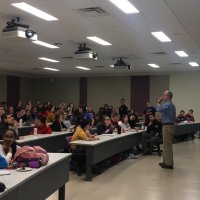
With the human population growing at a steep incline, scientists are putting energy towards developing new ways of maximizing food production for this increasing population. University of Massachusetts Professor and Endowed Chair in Renewable Energy Krish Thaigarajan Sharman presented this issue to the iCons Fall Workshop on October 29th, 2018, focusing on the future of aquaculture and its impact on food and energy sources. And despite the large scale and complexity of these issues, the UMass students provided innovative solutions.
Sharman’s research focuses on the idea of a “blue revolution,” which is a term used to describe an increase in aquaculture practices all over the world. The overarching idea is developing effective fish farming and aquaculture strategies will create a substantial protein source for the human population, while simultaneously cutting down carbon emissions that come from the meat industry.
And although it is taboo in some parts of the world, fish farming is just like any other form of farming. One species of fish is kept in an enclosed pen in water, along with other individuals of the same species.
In addressing this negative connotation around the idea of fish farming, Sharman explained, “We don’t not want farmed vegetables.”
However, just like any other farming, it comes with challenges. Populations will grow, and the pen becomes crowded. Overcrowding leads to a buildup of waste, a depletion of resources, and disease transmission. Sharman explained that in order to optimize the blue revolution, it was crucial to come up with scientifically sound ways of tackling these issues.
From here, Sharman and iCons Program Director Justin Fermann turned to the audience and asked how they would solve these problems. And discussion with fellow peers, the UMass iCons candidates shared new insight into the issue at hand.
One of the ideas discussed included increasing biodiversity among these fish populations. When a population of fish are kept inside an enclosed pen, separate from other fish, after multiple generations, they evolve to me genetically different then wild fish, even if they are the same species. To prevent this, one group suggested spawning smaller fish into the wild to fill depleted sources.
Fishing in the wild leads to supply depletion, because fish cannot mate fast enough to make up for the population loss. By releasing younger fish from the fish farming enclosures, the wild population is able to account for the fish lost.
Sharman found this idea particularly impressive, due to its previous applications in nature.
“People have seeded clouds before to create rain,” he explained “but it has not been applied to this situation.”
Other possible solutions developed in the work shop included genetically engineering the fish population to become resistant to parasites that have previously been a problem, or adding more biodiversity into the fish farming communities to increase biodiversity.
Fermann then asked the students the next question: who they would want on their team to develop these solutions. Nearly every group listed off fields such as marine biology, ecologists, and other biology fields. Paired with these answers, however, were other fields such as civil engineers and chemists.
And in practice, Sharman’s lab consists of many of the same fields, including biologists, ecologists, engineers and outreach coordinators.”
At the end of the workshop, current iCons students addressed the crowd with stories of their personal experiences in the program. Jack Moody, a sophomore physics major preparing for iCons 2 in the fall, described his iCons 1 class to the classroom.
“Justin and Scott came in and would say ‘malaria! Solve it!’ but we didn’t stop there. Real world data would be taken, computational models would be made, presentations and speaking in public,” he explained.
He is also a firm believer in the iCons classroom set up, and thinks it is an effective way to develop as a student.
Moody said, “It’s a good way of learning about interdisciplinary skills. You might think ‘I’m a computer science major, I can’t learn anything about biology.’ But iCons gives you the opportunity to reach outside of your comfort zone.”
Stay Connected